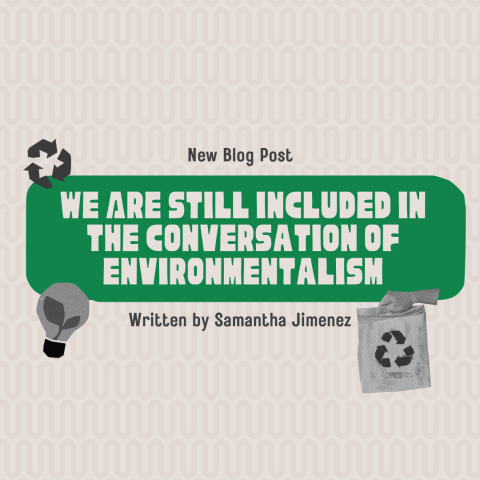We Are Still Included in the Conversation of Environmentalism

Accompanying the conversations surrounding how to live an eco-friendly life is a lot of inaccessible information and feelings of an unrealistic lifestyle. At the forefront of this stress and discouragement is a group that feels invisible amidst talks of activism. Environmentally conscious practices are often associated with expenses added on to living, such as organic foods or eco-friendly clothing, and knowledge that takes years to obtain like through master's degree programs. Naturally, that stigma can turn people away from feeling worthy enough to join in the conversation - I’ve been there myself.
In the minds of people who feel this way, we may be convinced that we do not have the skill set or academic background to be involved in community events or scholarly conversations. We might even push ourselves into the background of these happenings, saying “That’s not really my thing.” If we have trouble understanding such issues, we seemingly invalidate ourselves and bar ourselves from learning anything whatsoever.
“A recent study found that some of the most common terms in climate science are confusing to the general public,” stated the NPR article, Enough With The Climate Jargon: Scientists Aim For Clearer Messages On Global Warming. “Clear climate communication gets more important every day because climate change is affecting every part of life on Earth.”
As a first-generation American and college student, I do not have family members who worked in various STEM-focused careers – ones that my peers seem to be connected with in some way. Through my time in college, I have met countless people who know so much about policies, research, and careers due to their uncles and cousins, and extended family members’ involvement in some higher positions or past higher education. I never gave this too much thought when I was younger since my hometown consisted of people like me who were children of immigrants, teaching our parents topics not covered in their minimal education. It was not until attending FSU that this feeling of being separated from others in this way came up. Others had much different resources than I did.
The misconception oftentimes comes from this idea that wealthier individuals have more resources and time to change their lifestyle, while lower-class individuals are too busy trying to make ends meet. In reality, a lot of survival habits of working-class citizens are inherently eco-friendly and are dismissed as such due to the purpose it originally served.
Beyond that, research continues to show that individuals with a lower socioeconomic status unknowingly benefit the environment in greater ways than higher-class practicing environmentalists.
“From a global perspective, the world's richest 10% is responsible for more than half of the world's fossil fuel emissions. In practice, this means that both a U.S. family of four making more than $45,000, and an individual making more than $17,000 fall into this group,” stated HuffPost article, Redefining Environmentalism: The Paradox of Wealthy Environmentalists.
Living an eco-friendly life is a behavioral change above anything else. Many people partake in environmentally beneficial practices and are not seen for their efforts due to these habits being done out of necessity.
With this, we must redefine what being an environmentalist is in our society and stray away from stigmas such as wealth, class, and education. The fight for environmental justice is difficult for all of us, but our exclusion from the conversation will not make the journey to our goals easier.
Change is beyond a lifestyle flip or daily routine that centers around being eco-friendly. Change is a result of any and all action that we contribute in whatever ways we can, whether that action is as simple as public transportation, and whether it is a completely conscious decision or not. Making an impact on our environment is more about the little changes we are willing to consistently make, the voices we are eager to hear and learn from, and the information we are happy to pass on to others.
